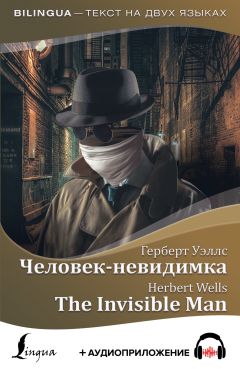Текст книги "Человек-невидимка / The Invisible Man + аудиоприложение"

Автор книги: Герберт Уэллс
Жанр: Иностранные языки, Наука и Образование
Возрастные ограничения: +12
сообщить о неприемлемом содержимом
Текущая страница: 4 (всего у книги 15 страниц) [доступный отрывок для чтения: 5 страниц]
Chapter XIII
Mr. Marvel Discusses His Resignation
When the dusk was gathering, a short man in a shabby silk hat was marching through the twilight on the road to Bramblehurst. He carried three books bound together, and a bundle wrapped in a blue table-cloth. His rubicund face expressed consternation and fatigue. He was accompanied by a voice, and ever and again he winced under the touch of unseen hands.
“If you run away again,” said the Voice, “if you attempt to run away again-”
“Lord!” said Mr. Marvel. “Oh, that hurts!”
“On my honour,” said the Voice, “I will kill you.”
“I didn’t try to run away,” said Marvel. “I swear I didn’t. I didn’t know where to turn! How the devil could I know that?”
Mr. Marvel became silent. He blew out his cheeks, and his eyes were eloquent of despair.
“It’s bad enough to let these yokels explode my little secret, without your trying to go away with my books. No one knew I was invisible! And now what am I to do?”
“What am I to do?” asked Marvel.
“Everybody knows that now. It will be in the papers! Everybody will be looking for me!”
Mr. Marvel’s pace slackened.
“Go on!” said the Voice sharply. “Don’t drop those books, stupid. The fact is, I shall have to make use of you… You’re a poor tool, but I must.”
“I’m a miserable tool,” said Marvel.
“You are,” said the Voice.
“I’m the worst possible tool you could have,” said Marvel. “And I’m not strong at all.”
“No?”
“And my heart is weak.”
“Well?”
“I haven’t the nerve and strength for the sort of thing you want.”
“I’ll stimulate you.”
“I wish you wouldn’t. But I can mess up your plans, you know. I am cowardly and miserable.”
“You’d better not,” said the Voice.
“It’s better to die,” said Marvel. “It’s not fair. You must admit… It seems to me I have the right-”
“Go on!” said the Voice.
Mr. Marvel mended his pace, and for a time they went in silence again.
“It’s devilish hard,” said Mr. Marvel.
This was quite ineffectual. He tried again.
“What will I get for that?” he began.
“Oh! Shut up!” said the Voice. “Just do what you’re told. You’re a fool, but you’ll do it.”
“I tell you, sir, I’m not the man for it.”
“If you don’t shut up I shall twist your wrist again,” said the Invisible Man. “I want to think.”
Presently two oblongs of yellow light appeared through the trees, and the square tower of a church loomed through the gloaming.
“I shall keep my hand on your shoulder,” said the Voice, “all through the village. Go straight through and try no foolery.”
“I know that,” sighed Mr. Marvel, “I know all that.”
The unhappy-looking figure in the obsolete silk hat passed up the street of the little village with his burdens, and vanished into the gathering darkness.
Chapter XIV
At Port Stowe
Ten o’clock the next morning found Mr. Marvel, unshaven, and dirty sitting with the books beside him and his hands deep in his pockets, looking very weary, nervous, and uncomfortable, and inflating his cheeks at infrequent intervals, on the bench outside a little inn on the outskirts of Port Stowe. Beside him were the books, tied with string. The bundle had been abandoned in the woods beyond Bramblehurst, in accordance with a change in the plans of the Invisible Man. Mr. Marvel’s hands would go ever and again to his various pockets with a curious nervous fumbling.
When he had been sitting for an hour, an elderly mariner, carrying a newspaper, came out of the inn and sat down beside him.
“Pleasant day,” said the mariner.
“Very,” said Mr. Marvel.
“Just seasonable weather for the time of year,” said the mariner.
“Quite,” said Mr. Marvel.
The mariner’s eyes examined Mr. Marvel’s dusty figure, and the books beside him. As he had approached Mr. Marvel he had heard a sound like the dropping of coins into a pocket.
“Books?” the mariner said suddenly.
Mr. Marvel looked at them.
“Oh, yes,” he said. “Yes, they’re books.”
“There are some extraordinary things in books,” said the mariner.
“I believe you,” said Mr. Marvel.
“And some extraordinary things out of them,” said the mariner.
“That’s true,” said Mr. Marvel. He eyed his interlocutor.
“There are some extraordinary things in newspapers, for example,” said the mariner.
“There are.”
“In this newspaper,” said the mariner.
“Ah!” said Mr. Marvel.
“There’s a story,” said the mariner, fixing Mr. Marvel with an eye that was firm and deliberate; “there’s a story about an Invisible Man, for instance.”
Mr. Marvel scratched his cheek and felt his ears glowing.
“What will they be writing next?” he asked faintly. “Australia or America?”
“Neither,” said the mariner. “Here.”
“Lord!” said Mr. Marvel, starting.
“When I say here,” said the mariner, to Mr. Marvel’s intense relief, “I don’t of course mean here in this place, I mean hereabouts.”
“An Invisible Man!” said Mr. Marvel. “And what does he do?”
“Everything,” said the mariner, controlling Marvel with his eye, and then amplifying, “every-thing.”
“I haven’t seen papers for four days,” said Marvel.
“He was at Iping,” said the mariner.
“Indeed!” said Mr. Marvel.
“He started there. And where he came from, nobody doesn’t seem to know. Here it is: ‘Peculiar Story from Iping.’ And it says in this paper that the evidence is extraordinary strong.”
“Lord!” said Mr. Marvel.
“Yes, it’s an extraordinary story. A clergyman and a doctor saw him, or to be exact, didn’t see him. He was staying, it says, at the ‘Coach and Horses,’ and no one was aware of his misfortune, until his bandages on his head were torn off. It was then observed that his head was invisible. They tried to catch him, but casting off his garments, he succeeded in escaping. And he had seriously wounded our constable, Mr. J. A. Jaffers. What a story, eh?”
“Lord!” said Mr. Marvel, looking nervously about him, trying to count the money in his pockets. “It sounds most astonishing.”
“Indeed! Extraordinary, I call it. I have never heard of Invisible Men before.”
“And that’s all what he did?” asked Marvel.
“It’s enough, isn’t it?” said the mariner.
“Did he go back to Iping?” asked Marvel. “Just escaped and that’s all, eh?”
“All!” said the mariner. “Why! Isn’t it enough?”
“Quite enough,” said Marvel.
“I should think it was enough,” said the mariner. “I should think so.”
“He didn’t have any pals-it doesn’t say he had any pals, does it?” asked Mr. Marvel, anxious.
“You want more of them?” asked the mariner. “No, thank Heaven, he didn’t.”
He nodded his head slowly.
“It makes me uncomfortable, the thought of that chap running about the country! He is free. And they say he may go to Port Stowe. Just think of the things he might do! Let’s suppose he wants to rob-who can prevent him? He can trespass, he can burgle, he could walk through a cordon of policemen! And wherever there was wine he liked-”
“He’s got an advantage, certainly,” said Mr. Marvel.
“You’re right,” said the mariner. “He has.”
Mr. Marvel looked about him, listened, bent towards the mariner, and lowered his voice:
“The fact is-I know something about this Invisible Man. From private sources.”
“Oh!” said the mariner, interested. “You?”
“Yes,” said Mr. Marvel. “Me.”
“Indeed!” said the mariner. “And may I ask-”
“You’ll be astonished,” said Mr. Marvel behind his hand. “It’s tremendous.”
“Indeed!” said the mariner.
“The fact is,” began Mr. Marvel in a confidential tone. Suddenly his expression changed marvellously. “Oh!” he said. His face was eloquent of physical suffering.
“Wow!” he said.
“What’s up?” said the mariner.
“Toothache,” said Mr. Marvel, and put his hand to his cheek. He took his books. “I must go, I think,” he said.
“But you were going to tell me about this Invisible Man!” protested the mariner.
“Hoax,” said a Voice.
“It’s a hoax,” said Mr. Marvel.
“But it’s in the paper,” said the mariner.
“Hoax, I tell you,” said Marvel. “I know the chap that told this lie. There is no Invisible Man whatsoever.”
“But how about this paper? Do you mean to say-?”
“The paper lies,” said Marvel, stoutly.
The mariner stared, paper in hand.
“Wait a bit,” said the mariner, rising and speaking slowly, “Do you mean to say-?”
“I do,” said Mr. Marvel.
“Then why did you listen to me? Why didn’t you stop me? Eh?”
Mr. Marvel blew out his cheeks. The mariner was suddenly very red indeed; he clenched his hands.
“I have been talking here for ten minutes,” he said; “and you, you little pig, couldn’t have the elementary manners-”
“Come up,” said a Voice, and Mr. Marvel was suddenly stood up in a curious spasmodic manner.
“You’d better get away,” said the mariner.
Mr. Marvel went away, but the mariner still stood for some time. Then he turned himself towards Port Stowe.
And there was another extraordinary thing he heard, that had happened quite close to him. That was a vision of a “fist full of money” travelling along by the wall. Another mariner had seen this wonderful sight that morning. He had tried to catch the money and had been knocked down. The story of the flying money was true. And all about that neighbourhood, money had been floating quietly along by walls and shady places. And then the money had ended its mysterious flight in the pocket of the gentleman in the obsolete silk hat, sitting outside the little inn on the outskirts of Port Stowe.
It was ten days after-and the mariner collated these facts and began to understand how near he had been to the wonderful Invisible Man.
Chapter XV
The Man Who Was Running
In the evening Dr. Kemp was sitting in his study in the belvedere on the hill overlooking Burdock. It was a pleasant little room, with three windows-north, west, and south-and bookshelves covered with books and scientific publications, and a broad writing-table, and, under the north window, a microscope, minute instruments, and scattered bottles of reagents. Dr. Kemp’s lamp was lit, albeit the sky was still bright. Dr. Kemp was a tall and slender young man, with flaxen hair and a moustache almost white. His work would earn him, he hoped, the fellowship of the Royal Society, so highly did he think of it.
His eye caught the sunset blazing at the back of the hill. For a minute perhaps he sat, pen in mouth, admiring the rich golden colour above the crest, and then his attention was attracted by the little figure of a man, running towards him. He was a short little man, and he wore a high hat, and he was running very fast.
“Another of those fools,” said Dr. Kemp. “Like that ass who ran into me this morning round a corner, with the ‘‘The Invisible Man is coming, sir!’ One might think we were in the thirteenth century.”
He got up, went to the window, and stared at the dark little figure.
“He is in a hurry,” said Dr. Kemp, “but he doesn’t seem to succeed. Asses!”
Dr. Kemp walked back to his writing-table.
But those who saw the fugitive nearer, and perceived the terror on his face, did not share in the doctor’s contempt. As the man ran he chinked like a well-filled purse. He looked neither to the right nor the left, but his eyes stared straight downhill to where the lamps were being lit, and the people were crowded in the street. A foam lay on his lips, and his breath came hoarse and noisy.
And then presently, far up the hill, a dog playing in the road yelped and ran under a gate. Then something-a wind-a pad, pad, pad, – a sound like a panting breathing, rushed by.
People screamed. They were shouting in the street before Marvel was halfway there. They were slamming the doors behind them, with the news. In a moment, fear had seized the town.
“The Invisible Man is coming! The Invisible Man!”
Chapter XVI
In the “Jolly Cricketers”
The “Jolly Cricketers” is just at the bottom of the hill, where the tram-lines begin. The barman talked of horses with an anaemic cabman, while a black-beared man in gray ate biscuit and cheese, drank beer, and conversed with a policeman off duty.
“What’s the shouting about?” said the anaemic cabman.
Somebody ran by outside.
“Fire, perhaps,” said the barman.
Footsteps approached, running heavily, the door was pushed open violently, and Marvel, weeping and dishevelled, rushed in, made a convulsive turn, and attempted to shut the door.
“Coming!” he bawled, his voice shrieking with terror. “He’s coming. The Inisible Man! After me! Help! Help! Help!”
“Shut the doors,” said the policeman. “Who’s coming? What’s the matter?”
He went to the door, and it slammed.
“Let me go inside,” said Marvel, staggering and weeping, but still clutching the books. “Let me go inside. Lock me in-somewhere. I tell you he’s after me. I escaped. He said he’d kill me and he will.”
“You’re safe,” said the man with the black beard. “The door’s shut. What’s it all about?”
“Let me go inside,” said Marvel, and shrieked aloud as a blow suddenly made the fastened door shiver. There was a hurried rapping and a shouting outside.
“Hello,” cried the policeman, “who’s there?”
Mr. Marvel cried, “He’ll kill me-he’s got a knife or something. Help me!”
“Come in here,” said the barman.
And he held up the flap of the bar.
“Don’t open the door,” Mr. Marvel screamed. “Please don’t open the door! Where shall I hide?”
“This, this Invisible Man, then?” asked the man with the black beard. “I guess it’s about time to see him.”
The window of the inn was suddenly smashed in, and there was a screaming and running to and fro in the street. The policeman had been trying to see who was at the door.
“It’s him,” he said.
The barman stood in front of the bar-parlour door which was now locked on Mr. Marvel, stared at the smashed window, and came round to the two other men.
Everything was suddenly quiet.
“I wish I had my truncheon,” said the policeman, going to the door. “When we open the door, he will come in. We can’t stop him.”
“Don’t hasten to open that door,” said the anaemic cabman, anxiously.
“Draw the bolts,” said the man with the black beard, “and if he comes-”
He showed a revolver in his hand.
“That won’t do,” said the policeman; “that’s murder.”
“I know what country I’m in,” said the man with the beard. “I’m going to let off at his legs. Draw the bolts.”
“Not at my neck,” said the barman.
“Very well,” said the man with the black beard, and drew the bolts himself. Barman, cabman, and policeman looked at each other.
“Come in,” said the bearded man, facing the unbolted doors with his pistol behind him.
No one came in, the door remained closed. Five minutes afterwards when a second cabman came in, they were still waiting, and an anxious face peered out of the bar-parlour and asked, “Are all the doors of the house shut? He’s going round-prowling round. He’s as artful as the devil.”
“Good Lord!” said the barman. “There’s the back door!”
He looked about him helplessly. The bar-parlour door slammed and they heard the key turn.
“There’s the yard door and the private door. The yard door-”
He rushed out of the bar.
In a minute he reappeared with a carving-knife in his hand.
“The yard door was open!” he said.
“He may be in the house now!” said the first cabman.
“He’s not in the kitchen,” said the barman. “There are two women there, and they don’t think he’s come in. They haven’t noticed anything.”
“Have you fastened it?” asked the first cabman.
“Of course,” said the barman.
The man with the beard replaced his revolver. And the flap of the bar was shut down and the bolt clicked, and then with a tremendous thud the catch of the door snapped and the bar-parlour door burst open. They heard Marvel squeal like a leveret, and they were clambering over the bar to his rescue. The bearded man’s revolver cracked and the looking-glass at the back of the parlour starred.
As the barman entered the room he saw Marvel, curiously crumpled up and struggling against the door that led to the yard and kitchen. The door flew open while the barman hesitated, and Marvel was dragged into the kitchen. Marvel was then forced to the kitchen door, and the bolts were drawn.
Then the policeman rushed in, followed by one of the cabmen, gripped the wrist of the invisible hand that collared Marvel, was hit in the face and went back. The door opened. Then the cabman collared something.
“I got him!” said the cabman. “Here he is!”
Mr. Marvel, released, suddenly dropped to the ground and made an attempt to crawl behind the legs of the fighting men. The voice of the Invisible Man was heard for the first time, yelling out sharply, as the policeman trod on his foot. Then he cried out passionately and his fists flew round. The cabman suddenly whooped. The door into the bar-parlour from the kitchen slammed and covered Mr. Marvel’s retreat. The men in the kitchen found themselves struggling with empty air.
“Where’s he gone?” cried the man with the beard. “Out?”
“This way,” said the policeman, stepping into the yard and stopping.
“I’ll show him,” shouted the man with the black beard, and five bullets had followed one another. As he fired, the man with the beard moved his hand in a horizontal curve.
A silence followed.
“Five bullets,” said the man with the black beard. “Four aces and a joker. Get a lantern, someone, let’s find his body.”
Chapter XVII
Dr. Kemp’s Visitor
Dr. Kemp had continued writing in his study until he heard the shots. Crack, crack, crack, they came one after the other.
“Hello!” said Dr. Kemp, putting his pen into his mouth again and listening. “Who’s shooting in Burdock? What are these asses doing now?”
He went to the south window, threw it up, and stared down.
“Looks like a crowd,” he said, “by ‘The Cricketers,’” and remained watching.
After five minutes, Dr. Kemp sighed, pulled down the window again, and returned to his writing desk.
In an hour after this the front-door bell rang. Dr. Kemp sat listening. He heard the servant answer the door, and waited for her feet on the staircase, but she did not come.
“I wonder what that was,” said Dr. Kemp.
He got up, went downstairs from his study, rang, and called the housemaid. She appeared in the hall below.
“Was that a letter?” he asked.
“Only a ring, sir. Just a ring, that’s all,” she answered.
He went back to his study. It was two o’clock before Dr. Kemp had finished his work for the night. He rose, yawned, and went downstairs to bed. Then he noticed that he was thirsty. He took a candle and went down to the dining-room.
He noticed a dark spot on the linoleum near the mat at the foot of the stairs. He went on upstairs, and then it suddenly occurred to him to ask himself what the spot on the linoleum might be.
He went back to the hall, and bending down, touched the spot. Without any great surprise he found it was blood.
He returned upstairs, looking about him. Then he saw something and stopped astonished. The door-handle of his own room was blood-stained.
He looked at his own hand. It was quite clean, and then he remembered that the door of his room had been open when he came down from his study, and that consequently he had not touched the handle at all. He went straight into his room. His glance, wandering inquisitively, fell on the bed. The sheet had been torn. On the further side the bedclothes were depressed as if someone had been recently sitting there.
Then he had an odd impression that he had heard a low voice say, “Good Heavens! Kemp!”
But Dr. Kemp was no believer in voices. Was that really a voice? He looked about again, but noticed nothing. Then he distinctly heard a movement across the room, near the wash-hand stand. All men, however highly educated, retain some superstitions. He closed the door of the room, and came forward to the dressing-table. Suddenly he saw a blood-stained bandage hanging in the air, between him and the wash-hand stand.
Suddenly a voice spoke quite close to him.
“Kemp!” said the Voice.
“Eh?” said Kemp, with his mouth open.
“Keep your nerve,” said the Voice. “I’m an Invisible Man.”
Kemp made no answer for a space, simply stared at the bandage.
“Invisible Man,” he said.
“I am an Invisible Man,” repeated the Voice.
The story he had ridiculed only that morning rushed through Kemp’s brain.
“I thought it was all a lie,” he said. “Oh! But this is nonsense. It’s some trick.”
He stepped forward suddenly, and his hand met invisible fingers.
“Keep your nerve, Kemp, for God’s sake! I want help badly. Stop!”
The hand gripped his arm.
“Kemp!” cried the Voice. “Kemp! Keep your nerve!” and the grip tightened.
Kemp was suddenly flung upon the bed. He opened his mouth to shout, and the corner of the sheet was thrust between his teeth.
“Listen to reason, will you?” said the Invisible Man. “By Heaven! Lie still, you fool!” bawled the Invisible Man in Kemp’s ear. “If you shout, I’ll smash your face,” said the Invisible Man, relieving Kemp’s mouth.
“I’m an Invisible Man. It’s no foolishness, and no magic. I really am an Invisible Man. And I want your help. I don’t want to hurt you, but if you behave like a fool, I must. Don’t you remember me, Kemp? We were studying together. Do you remember the University College?”
“Let me get up,” said Kemp. “And let me sit quiet for a minute.”
He sat up.
“I am Griffin, of University College, and I have made myself invisible. I am just an ordinary man-a man you have known-made invisible.”
“Griffin?” said Kemp.
“Griffin,” answered the Voice. “A student six feet high, with a pink and white face and red eyes, who won the medal for chemistry.”
“I am confused,” said Kemp. “Why Griffin?”
“I am Griffin.”
Kemp thought.
“It’s horrible,” he said. “But what devilry must happen to make a man invisible?”
“It’s no devilry. It’s an intelligible process.”
“It’s horrible!” said Kemp. “But how?”
“It’s horrible enough. But I’m wounded and in pain, and tired. Great God! Kemp, give me some food and drink, and let me sit down here.”
Kemp stared at the bandage as it moved across the room, then saw a basket chair dragged across the floor and come to rest near the bed.
Kemp rubbed his eyes.
“This is more interesting than ghosts,” he said, and laughed stupidly.
“That’s better. Thank Heaven, you’re getting sensible!”
“Or silly,” said Kemp, and knuckled his eyes.
“Give me some whiskey. I’m near dead.”
“Where are you? There! All right. Whiskey? Here. Where shall I give it to you?”
The chair creaked and Kemp felt the glass drawn away from him. It stopped twenty inches above the front edge of the seat of the chair. He stared at it in perplexity.
“This is-this must be-hypnotism. You just tell me that you are invisible, and I believe you.”
“Nonsense,” said the Voice. “Listen to me. I’m starving, and the night is chilly to a man without clothes.”
“Food?” said Kemp.
“Yes,” said the Invisible Man. “Have you a dressing-gown?”
Kemp walked to a wardrobe and produced a dressing-gown. It was taken from him. It hung for a moment in the air, fluttered weirdly, and sat down in his chair.
“Trousers, socks, slippers,” said the Unseen, curtly. “And food.”
“Anything. But this is the strangest thing I have seen in my life!”
He went downstairs to take some clothes. He came back with some cold cutlets and bread as well, and placed them before his guest.
The cutlet hung in the air, with a sound of gnawing.
“Invisible!” said Kemp, and sat down on a bedroom chair. “Of all the strange and wonderful-”
“Exactly. But it’s really strange that I found your house. My first luck! Anyhow I meant to sleep in this house tonight. My blood gets visible as it coagulates, I see. It’s only the living tissue I’ve changed, and only for as long as I’m alive… I’ve been in the house for three hours.”
“But how’s it done?” began Kemp, in a tone of exasperation. “The whole business-it’s unreasonable from beginning to end.”
“Quite reasonable,” said the Invisible Man. “Perfectly reasonable.”
He took the whiskey bottle. Kemp stared at the devouring dressing gown.
“What about the shots?” Kemp asked. “How did the shooting begin?”
“There was a fool-curse him! – who tried to steal my money. And he has done so.”
“Is he invisible too?”
“No.”
“Well?”
“Can I have some more to eat before I tell you all that? I’m hungry. And you want me to tell stories!”
Kemp got up.
“You didn’t do any shooting?” he asked.
“Not me,” said his visitor. “Some fool I’d never seen fired at random. They got scared. They all got scared at me. Curse them! I want to eat more, Kemp.”
“I’ll see what there is to eat downstairs,” said Kemp. “Not much, I’m afraid.”
After he had done eating, the Invisible Man demanded a cigar. It was strange to see him smoking; his mouth, and throat became visible when smoke cast.
“I’m lucky to meet you, Kemp,” he said. “You must help me. I suffered a lot. But we will work together. Let me tell you-”
He drank more whiskey. Kemp got up, and looked about him.
“You haven’t changed much, Kemp, these dozen years. I must tell you. We will work together!”
“But how was it all done?” said Kemp.
“For God’s sake, let me smoke in peace for a little while! And then I will begin to tell you.”
But the story was not told that night. The Invisible Man’s wrist was growing painful; he was feverish, and exhausted. He spoke in fragments of Marvel, his voice grew angry.
“He was afraid of me, I could see that he was afraid of me,” said the Invisible Man. “He wanted to escape! What a fool I was! The cur! I should have killed him!”
“Where did you get the money?” asked Kemp, abruptly.
“I can’t tell you tonight,” said the Invisible Man.
He leant forward, supporting his invisible head on invisible hands.
“Kemp,” he said, “I have not slept for three days. I must sleep soon.”
“Well, have my room-have this room.”
“But how can I sleep? If I sleep-he will get away. Ugh! What does it matter?”
“Is your wound serious?” asked Kemp, abruptly.
“Not at all. Oh, God! How I want sleep!”
“Why not?”
“Because I don’t want to be caught by my fellow-men,” he said slowly.
Kemp started.
“Fool that I am!” said the Invisible Man. “I’ve put the idea into your head.”
Правообладателям!
Данное произведение размещено по согласованию с ООО "ЛитРес" (20% исходного текста). Если размещение книги нарушает чьи-либо права, то сообщите об этом.Читателям!
Оплатили, но не знаете что делать дальше?








































